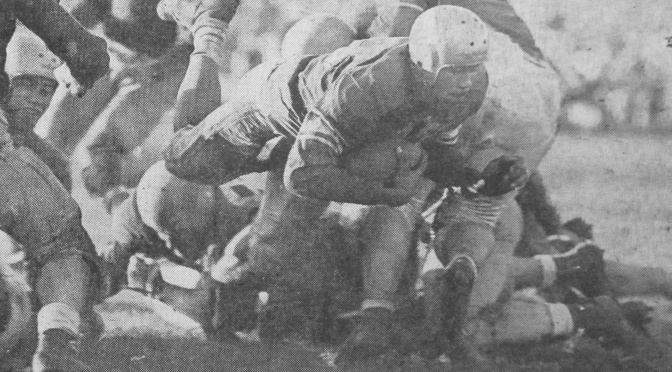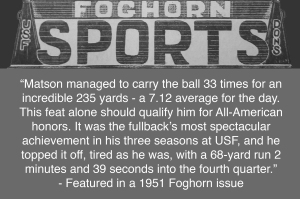Running back Ollie Matson had a magnificent 1951 season for the Dons, finishing first in the country in touchdowns. Matson would go on to play for 14 years in the NFL and compete as a runner in the 1952 Summer Olympics. (Photo featured in a 1951 Foghorn Issue)
USF students crowded around the three television screens on the University Center first floor on Sunday to watch “‘51 Dons”, an ESPN documentary covering the story of the 1951 USF football team that pulled off a 9-0 season and refused to play in a bowl game without its two African American players.
The screening event, which was held by Los Locos, USF’s student spirit group, was a popular place for students and other viewers to join together on a rainy afternoon. Los Locos provided food and beverages, and spectators were given shirts that read “I Stand With The ‘51 Dons” before sitting down to learn about a team that has a special place in USF history, and also had a profound impact on the movement towards racial equality in the mid-1900s.
The 1951 Dons football team was one of the most dominant of its era. Aside from finishing the season unbeaten, nine San Francisco players from the squad would go on to play in the NFL, and three would be inducted into the league’s Hall of Fame. While it is easy to list the Dons’ team and individual achievements from their illustrious season, even more impressive was the players’ choice to support their teammates and challenge racial inequality through their inaction.
After defeating Loyola University to complete their perfect year, it seemed certain that the Dons would receive an invitation to one of college football’s most decorated bowl games. Indeed, this turned out to be true, as USF was asked to compete in the Orange Bowl against Baylor. However, the request came with a catch: The Dons would be allowed to play in the Orange Bowl, but only if their pair of African American players, Ollie Matson and Burl Toler, were left behind. Upon hearing this, the band of brothers that made up the USF team immediately refused, making it clear that their close relationships with two of the team’s most talented and respected players meant much more to them than playing in the season’s defining game. Interestingly, USF’s decision was kept under wraps, and Georgia Tech was selected to play Baylor in an effort to make it look like the Dons were never chosen in the first place.
ESPN’s documentary, which was directed by Ron Luscinski, focuses on Matson and Toler, as well as star players Gino Marchetti and Ed Brown, as the Dons stormed through the 1951 season leaving all opponents in the dust. “‘51 Dons” also looks at the effect that the team’s decision has had on racial segregation in professional sports, as well as the aftermath of the 1951 season and the lasting friendships and bonds formed by the players. With a wide range of interviews, the documentary features insights from current USF staff, including President Stephen A. Privett, S.J. and Visiting Professor Clarence B. Jones. Other voices include Bob St. Clair, an offensive tackle on the 1951 team, and members of Matson and Toler’s families.
The audience at the viewing party laughed at St. Clair’s jokes, stared in awe as Matson’s incredible speed was showcased, and became emotional upon seeing pictures from the final time that Matson and Toler saw each other before they passed away. The film’s end credits were met with a resounding applause, and students left having gained valuable knowledge regarding a memorable part of the school’s history.
Junior psychology major and Los Locos member Olivia Traina learned a lot about USF’s past from the documentary.
“[Before], I definitely didn’t know the details of the whole situation, of the dynamics between the players themselves and what a tight-knit team they were, and also how big football was at USF for a while and how it had to come to an end because of an event like this,” Traina said. “But it’s really amazing how this fit into the whole scheme of the Civil Rights Movement.”
Others found themes in “‘51 Dons” that they could apply to modern-day USF and use to view the school’s current position from a new perspective.
“It’s really great to be able to look back and see something so important and so inspiring that we can all share,” Los Locos President Laticia Lonon said. “For whatever reason, we all happen to come [to USF], and it’s easy to complain about a hefty tuition or not liking certain aspects of what’s going on at school. But, at the end of it we came here for a reason, and I think it’s really inspiring that we can see where we came from and where we’re going, and how these are being paralleled.”
Many people likely heard about the 1951 San Francisco football team for the first time when they watched “‘51 Dons” on Sunday. Regardless, the often overlooked story of a squad that valued its camaraderie more than anything and elected to stand above racial discrimination has been felt throughout the sports world for the last 63 years. The 1951 football team’s refusal to play in the Orange Bowl has played no small part in decreasing the presence of racism in professional sports and also in the United States as a whole, and the team’s decision still epitomizes USF’s core values to this day.
“We are a school that shows a lot about how diverse we are and how diverse our city is,” junior communications major Brittany Silveira said. “I think the slogan ‘Change the World from Here’ – how they showed in the documentary that they did it before all the Civil Rights movements were going on – it just shows that they took a stand for what they believed in, and followed what the whole mission statement of USF is about.”



